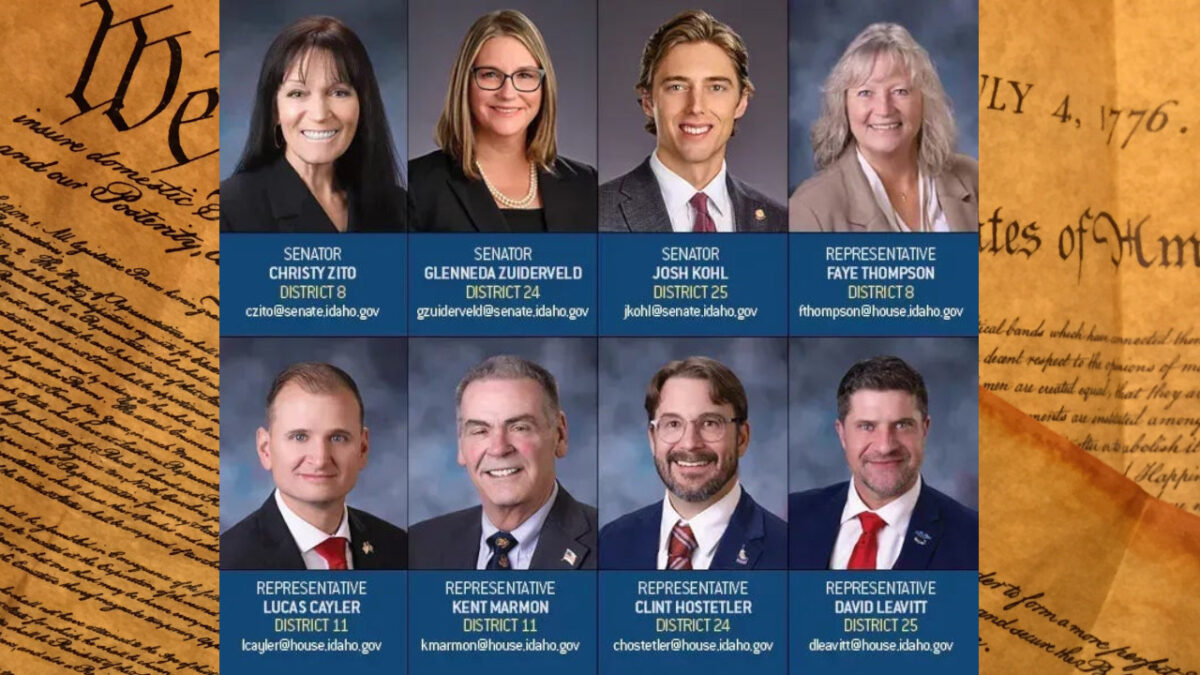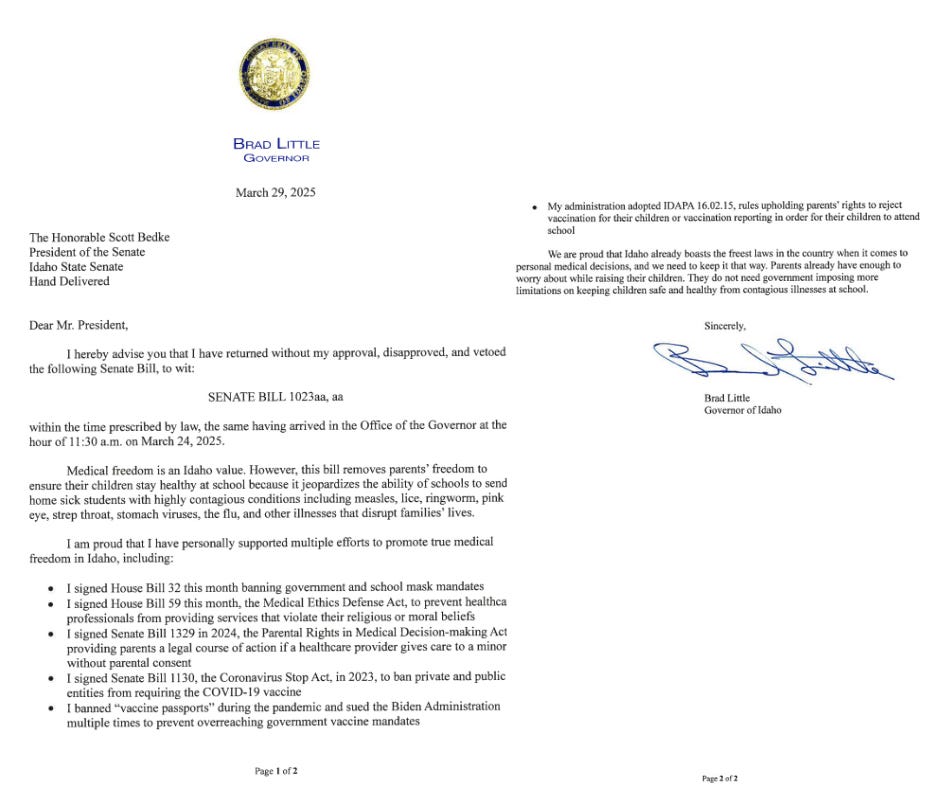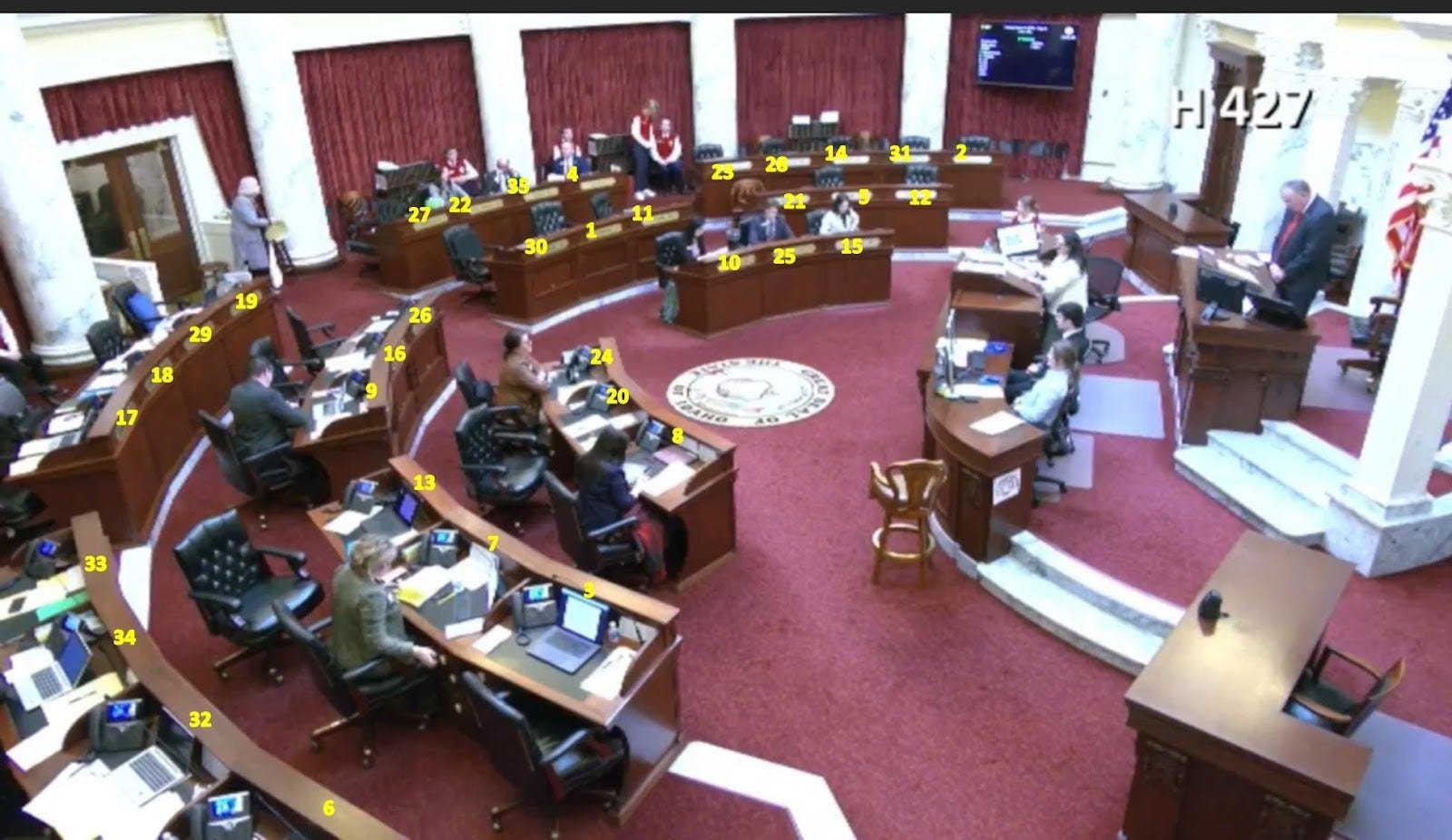This Op-Ed Courtesy of Zito for Idaho Substack
What You Need to Know From the Capitol This Week.
Governor Little Vetoes the Idaho Medical Freedom Act (S1023)
Senate Bill 1023—the Idaho Medical Freedom Act—is straightforward: It protects Idahoans from being forced to undergo medical interventions as a condition of employment, school attendance, or access to services. It upholds the principle that medical decisions belong to individuals and families, not government agencies or institutions.
The Governor’s veto message claimed that S1023 would stop schools from sending home sick kids. That is flatly false. Under Idaho Code § 33-512(4), schools already have clear authority to exclude students with contagious illnesses to protect public health. S1023 does not change or restrict that authority in any way.
What the bill does is prohibit schools from mandating medical interventions—like vaccines—as a condition for attendance. Schools can still send home symptomatic students and manage illness on campus using the same tools they’ve always had. Their ability to protect student health remains fully intact.
More broadly, the bill prohibits mandated medical procedures—such as vaccines or treatments—as a requirement for attending school or holding a job. It draws a clear line between responding to illness and forcing preventative interventions. No school, government office, or business should have the power to compel medical procedures. That’s what S1023 defends.
The Governor’s decision not only misrepresents the bill’s content—it also ignores the overwhelming number of Idahoans demanding medical freedom.
Because this is a Senate bill, it returns to the Senate for a potential override. But here’s the reality: the Senate only passed it with 19 votes. Twenty-four are needed to override, which means five senators need to flip.
Here are the senators who voted NO on S1023:
Bernt, Blaylock, Burtenshaw, Grow, Guthrie, Harris, Lent, Rabe, Semmelroth, Taylor, VanOrden, Ward-Engelking, Wintrow, and Woodward.
They need to hear from you—loudly and clearly. If the Senate can’t override the veto, the House won’t even get the chance.
Let them know that medical freedom is not negotiable. It will be the defining campaign issue in 2026.
Broken Budgets and Gag Rules in the Senate
This session, nearly all the budget bills are being jammed through in the final weeks—fast-tracked with little time for thoughtful scrutiny. The House has already killed a few of these bloated budgets, forcing them to be reworked and brought back for another vote. (You can find a more detailed list of those in last week’s Substack)
The Gang of 8 made a clear commitment: we will support maintenance-level budgets—funding essential services and state-approved pay raises—but we will vote no on any budget bill that goes beyond that and includes:
- New government positions. No unnecessary expansion of the bureaucracy.
- Excessive growth. Cap increases at 1.2% in replacement costs to cut waste and save nearly $1 billion.
- Federal funds with strings attached. Idaho must stop selling its sovereignty for D.C. dollars.
On Friday, the Senate took up H426, the enhancement budget for the State Controller’s Office. It proposed adding $15.2 million to an already massive $40.5 million budget and requested 10 new full-time positions on top of the 125 they already have.
Since it was a Friday and some senators seemed eager to head home, Senator Treg Bernt motioned to limit debate to just 90 seconds per legislator, with no opportunity to debate a second time. Senators Doug Ricks and Scott Grow seconded the motion—yes, Scott Grow, the Chair of JFAC. That raises a serious question: why would the chair of the Joint Finance-Appropriations Committee want to shut down debate on budget bills?
And here’s the catch: only floor debate was limited—not the bill sponsor’s opening and closing remarks. That meant Senator Bjerke could speak at length in support of the bill while all other senators were restricted to just 90 seconds. The result? Unlimited time to promote the bill and almost no time to challenge it.
Because of the time constraint, senators turned to the only remaining option: asking questions.
After two questions had been asked, Senator Joshua Kohl used his time to ask a clear and reasonable question: “Does the agency have any vacancies of FTPs?”
Senator Bjerke gave a long and winding answer, and the Senate went “at ease” due to the apparent violation of the rules. The rules were then modified to clarify the process moving forward.
Once the rules were clarified, the questioning continued. Senator Bjerke stated: “I will answer the first line of inquiry, and then I will yield no more.”
Senator Kohl could only ask this final question: “How many vacancies does that agency currently have, and if there are vacancies, why are we not just reutilizing those?”
You can watch the full exchange below:
Senator Kohl was not permitted to follow up with the next obvious questions:
- How long have those positions been vacant?
- What is happening with the unexpended money?
These are not stunts. They are responsible questions—the kind any employer or taxpayer would ask.
This was a legitimate attempt to understand where millions of taxpayer dollars are going. One of the least-known practices in government budgeting is that agencies often request funding for vacant full-time positions. Senator Kohl was doing exactly what legislators should do: asking the questions the public would ask if they were in the room.
After this rushed debate and dodged answers, Senator Kohl responded the only way he could: he requested that the next bill be read at length—a procedural move meant to slow things down and send a message.
Although the bill was only three pages long, senators began walking out as the secretary began reading it, and the chamber quickly emptied.
These are the same senators who accepted a 23% salary increase at the start of the session. Is it too much to ask that they stay in their seats and listen to the bills they vote on?
Sadly, this kind of behavior—leaving during debate or walking on controversial votes to avoid accountability—has become far too common.
Here’s a photo of the empty chamber.
Can you find your senator?
Now It’s Your Turn
We’re doing everything we can inside the Capitol to hold the line—but we need you standing with us on the outside.
Call your legislator. Write a letter. Show up. Speak out.
Let them know that medical freedom matters. That transparency matters. That you’re paying attention.
They may have the power, but you have the numbers. And this is far from over.
In Liberty,
Senator Christy Zito, District 8
CZito@senate.idaho.gov
Substack: @zitoforidaho
Senator Glenneda Zuiderveld, District 24
GZuiderveld@senate.idaho.gov
Substack: @glenneda
Senator Josh Kohl, District 25
JKohl@senate.idaho.gov
Substack: @joshkohl4idaho
Representative Faye Thompson, District 8
FThompson@house.idaho.gov
Representative Lucas Cayler, District 11
LCayler@house.idaho.gov
Substack: @lucascayler
Representative Kent Marmon, District 11
KMarmon@house.idaho.gov
Substack: @kentmarmon
Representative Clint Hostetler, District 24
CHostetler@house.idaho.gov
Substack: @theidahoresolve
Representative David Leavitt, District 25
DLeavitt@house.idaho.gov
Substack: @leavitt4idaho



